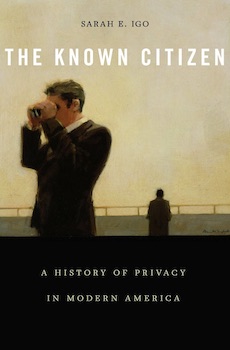Winner of the 2019 Ralph Waldo Emerson Award
By John McWilliams
The Known Citizen, winner of Phi Beta Kappa’s Ralph Waldo Emerson Award, is a long read (369 pages of text, 176 pages of footnotes) fully deserving of being absorbed slowly and attentively. As her subtitle states, Sarah E. Igo intends nothing less than a “History of Privacy in America,” not a history of the principle of “privacy” in constitutional law, nor in medical cases, but a cultural history of privacy as a concept that has greatly influenced daily behavior and our sense of who we are. Her introduction notes that “the scholarship [of privacy] remains heavily state-and rights-centered, neglecting privacy’s significance as a cultural sensibility and public value. Historical works that examine the idea of privacy in all of its unruliness, or even some of it, are scarce.” For a most recent example, compare Jill Lepore’s splendid These Truths: A History of the United States, published in the same year as The Known Citizen (2018). Lepore indexes “privacy” only as the “right to” privacy, and considers “privacy” almost exclusively as a guiding standard for legal justice. She therefore highlights William O. Douglas’ landmark assertion written in the Supreme Court’s majority opinion for Griswold v. Connecticut (1965): “We deal with a right of privacy older than the Bill of Rights—older than our political parties, older than our school system.”
Igo gives us full dress consideration of Griswold v. Connecticut as well as an earlier claim for “The Right to Privacy” in a widely read Harvard law Review essay of that title jointly written by Samuel Warren and Louis Brandeis (1890). But Igo surrounds these influential legal documents, along with many others, within multiple contexts of the changing societal, economic, governmental, and media-driven conditions that shaped them. She gives equal weight to popular culture, celebrity culture, journalism (high and low) and academic scholarship. Here are just a few of the important events and writings, re-arranged in chronological order, that Igo considers in relation to privacy: Henry James’ grievance against intrusive journalists, the shrill ring of the new telephone, the benefits and dangers of the new social security number, vast government collecting of personal data, W.H. Auden’s “The Unknown Citizen,” the intrusions of pop Freudianism, school personality testing, the right to sexual privacy both homosexual and heterosexual, Laud Humphrey’s Tearoom Trade (professional ethics of surreptitious research into gay sex in public restrooms, 1970), feminist criticism of the privacy argument in abortion cases, the notorious 12 hour TV documentary series An American Family (1973), Betty Ford’s personal revelations, the rise of confessional culture and the confessional memoir, commercial recording of our purchases, social media, tracing our geo-location, and inevitably, the dominance of the Internet. Only the iPhone seems missing here.
Amid such a diversity of topics, incidents and examples, the difficulty for Igo’s reader is to sort through the plethora of materials to her overriding argument. She is a scrupulous, impartial writer who approaches opposed responses to privacy issues with an open mind and with a daunting knowledge that lend plausibility to conflicting assertions made in particular historical contexts. Her book arrives at no conclusion, no easy or consoling takeaway. Instead, Igo uncovers a recurring pattern, sometimes stated but often implied, that has continued since the 1880s, when her narrative of America’s privacy issues begins. Baldly stated, she finds that the right to privacy has always been opposed by the right to know. Our felt “right to be let alone” is opposed by our felt “right to be known” both in jurisprudence and in our hearts and desires. We ask government to protect the rights of both privacy and publicity. We protect the search for knowledge (a plausible legacy of the First Amendment) while we oppose intrusions upon what Brandeis called our “inviolate personality” (a plausible legacy of the Fourth Amendment). As we become ever more known to threatening outside forces, our concerns for privacy rise in rough proportion. Igo remarks of the 1980s, “Especially critical was the simultaneous establishment of privacy rights and the recognition of their inadequacy to solving the problem of privacy in a surveillance society.” The reader is left to assume that this paradox must and will continue without resolution, but with ever greater intensity, into future eras.
I close with a personal reflection on the terminology Igo has used to unfold the privacy issues of near contemporary times. Since about 1950, all of the following new words and phrases have entered into common American parlance: “motivational research,” “personality testing,” “Big Data,” “digital dossier,” “the record prison,” “group therapy,” “celebrity culture,” “fame whore,” “reality TV,” “the quantified self,” “the Internet,” “identity theft,” “cyberbullying,” “algorithm,” “technology transfer,” “the Dark Net,” “blog,” “tweet,” “transparency,” and, perhaps most revealing of all, “the surveillance society.” Accordingly, Orwell’s 1984 serves as a shadowy presence throughout Igo’s book. So is it merely subjective to suggest that the dominant tone in which most of these terms are used has been, and will remain, a wary fear? Has the power of new media left us with precious little of the “individual self” that Emerson and Tocqueville so valued in 1830s America? Which do we fear more, that someone is watching or that no one is watching? If you have become fully “known,” can you be free? Do you truly believe that your money, your medical history, and your intimate speech are protected behind the presumed wall of cryptograms constructed mostly by others? One thing seems sure. The technology that makes us “known” will only become ever more powerful. Can Auden’s once “unknown citizen” do more than trust amid ever increasing fears?
John McWilliams (ΦBK, Princeton University, 1962) is an emeritus professor of humanities at Middlebury College and a resident member of the Beta of Vermont Chapter of Phi Beta Kappa.




